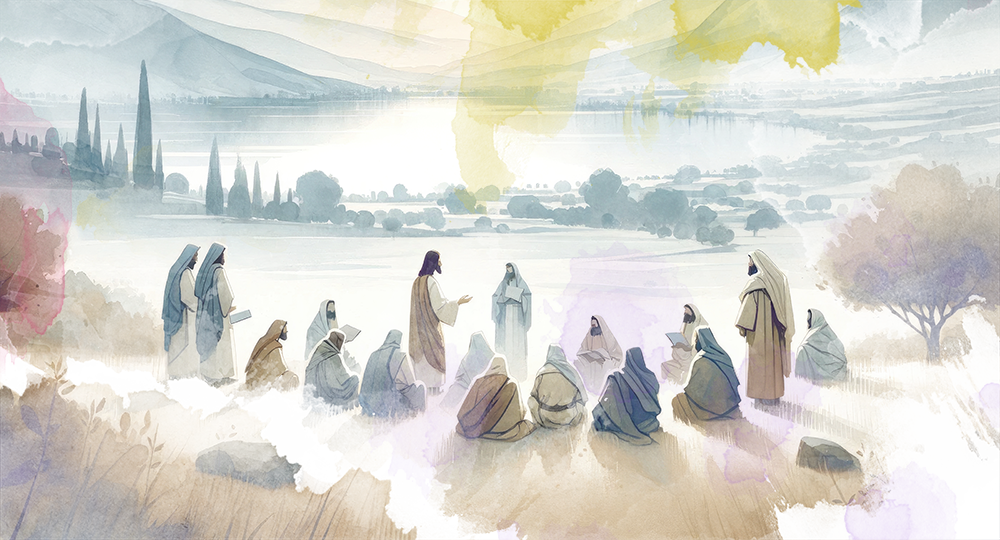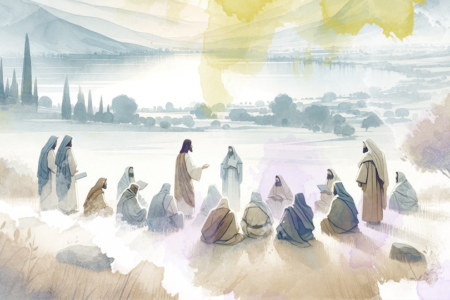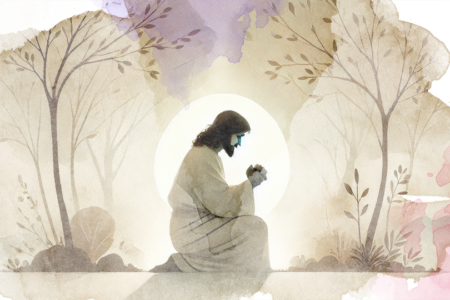The Authority of God’s Kingdom
How close did Israel come to seeing a Davidic Kingdom on Earth again? So close, and yet, so far.
I once caught an episode of a television reality show where a corporate CEO disguised himself as a regular employee to work at a branch of his company. He soon discovered local management mistreating the workers and became so angry he took charge and immediately fired the branch leadership. Everyone was in shock, as this common employee suddenly began exercising authority.
Although all analogies break down when stretched beyond their intended purpose, the show nevertheless reminded me of Jesus, particularly when He cleansed the Temple from corruption. He used His authority multiple times, even though most of the people there didn’t realize who He was.
Unlike the CEO, of course, Jesus cited Scripture to affirm His position. On one occasion, He called the Temple “My house” (Mt. 21:13; Mk. 11:17; Lk. 19:46); and on another, He called it “My Father’s house” (Jn. 2:16). In each case, His actions fulfilled God’s Word: Zeal for God’s house, defiled by merchant thieves, consumed Him (Ps. 69:9; Jn. 2:17).
By What Authority?
Eventually, the chief religious leaders confronted the Messiah and asked, “By what authority are You doing these things? And who gave You this authority?” (Mt. 21:23; cf. Mk. 11:28; Lk. 20:2).
Rather than replying directly, the Lord exposed their lack of authority to interrogate Him, answering their question with a question that underscored their guilt. Interestingly, many who saw Jesus’ miracles knew where His power came from because it pointed them to the Hebrew Scriptures.
(1) Teaching. “The people were astonished . . . for He taught them as one having authority” (Mt. 7:28–29). God foretold this authority in Deuteronomy 18:19: “He speaks in My name.” Citing Moses, Jesus declared, “I have come in My Father’s name, and you do not receive Me” (Jn. 5:43).
(2) Exorcising. Jesus’ fame spread because “with
authority He commands even the unclean spirits, and they obey Him” (Mk. 1:27; cf. Mt. 8:16). Only God possesses the power to control demons (cf. 1 Ki. 22:19–23).
(3) Healing. His many healing miracles fulfilled prophecy (Mt. 8:17; cf. Isa. 53:4) and demonstrated His divine control over our physical bodies (cf. Ex. 4:5–7; Ps. 103:3).
(4) Forgiving. Jesus also demonstrated His power to forgive sins: “‘But that you may know that the Son of Man has power on earth to forgive sins’—He said to the paralytic, ‘I say to you, arise, take up your bed, and go to your house’” (Mk. 2:10–11). When the paralytic did so, “all were amazed and glorified God” (v. 12). Even the scribes and Pharisees, who opposed Jesus vigorously, understood only God can forgive sin (Lk. 5:21; cf. Ps. 86:5; 99:8; 103:2–3).
(5) Controlling Creation. When a great tempest arose on the Sea of Galilee and waves washed over the disciples in their boat, Jesus calmed the storm, demonstrating His power over nature. The disciples marveled, “Who can this be, that even the winds and the sea obey Him?” (Mt. 8:27). As Lord of creation, He also is Lord over a key aspect of creation: “The Son of Man is Lord even of the Sabbath,” He said (12:8; cf. Gen. 2:2–3).
Astonishingly, Jesus didn’t use His authority ostentatiously or claim it as His own. After healing a man at the Pool of Bethesda, He said, “The Son can do nothing of Himself, but what He sees the Father do . . .
the Son also does in like manner” (Jn. 5:19).
No one could possess this authority except the Jewish Messiah: “All things have been delivered to Me by My Father, and no one knows the Son except the Father. Nor does anyone know the Father except the Son, and the one to whom the Son wills to reveal Him” (Mt. 11:27).
Interestingly, many people don’t realize this divine Father-and-Son language is by no means exclusive to the New Testament. Psalm 2, written 1,000 years earlier, declares, “Kiss the Son, lest He be angry, and you perish in the way, when His wrath is kindled but a little. Blessed are all those who put their trust in Him” (v. 12).
Jesus Is the Kingdom
The Messiah’s divinity is intimately connected to the Temple concept. Jesus told the Jewish leaders, “‘Destroy this temple, and in three days I will raise it up.’ But He was speaking of the temple of His body” (Jn. 2:19, 21). The leaders thought He was speaking of the Second Temple, often called Herod’s Temple.
Unlike Solomon’s Temple, the Second Temple had no She-kinah Glory cloud of God. Ezekiel recorded the Shekinah’s departure from the First Temple: “And the glory of the Lord went up from the midst of the city and stood on the mountain,” Mount Olivet (Ezek. 11:23). The only time God’s presence visited the Second Temple was through Messiah Jesus, the second Person of the triune Godhead—which is why Jesus told the Pharisees, “In this place there is One greater than the temple” (Mt. 12:6).
Jesus performed miracles to demonstrate kingly authority, but Jerusalem’s leaders refused to acknowledge what others realized. When Nathaniel, for example, saw that Jesus knew his thoughts, he declared, “Rabbi, You are the Son of God! You are the King of Israel!” (Jn. 1:49).
Jesus confirmed who He was when asked (18:37). He spoke of His glorious throne (Mt. 25:31; cf. Lk. 1:32) and asserted that both He and His Kingdom were not of this world (Jn. 17:16; 18:36).
Today, a common objection to Jesus’ Messiahship is, “If Jesus is the Messiah, why isn’t there a kingdom of peace on Earth?” He addressed this question when the Pharisees asked Him when the Kingdom was coming: “The kingdom of God is not coming with signs to be observed; nor will they say, ‘Look, here it is!’ or, ‘There it is!’ For behold, the kingdom of God is in your midst” (Lk. 17:20–21, NASB).
In other words, Jesus is the Kingdom; but the 1st-century Israelites would not be privileged to visibly witness and verify the Messianic Age. Why? Jesus explained that He first “must suffer many things and be rejected by this generation” (v. 25). Establishing His Kingdom required His atoning death, and His people’s rejection of Him would delay the Messianic Age.
‘O Jerusalem, Jerusalem’
With His rejection in view, Jesus understandably lamented over Jerusalem: “He saw the city and wept over it, saying, ‘If you had known . . . the things that make for your peace! But now they are hidden from your eyes’” (19:41–42). And He described the impending destruction “because you did not know the time of your visitation” (v. 44).
Knowing the thoughts of their evil hearts, Jesus also delivered a series of scathing verbal judgments against the
religious leaders (Mt. 23:1–36; Mk. 12:38–40; Lk. 20:45–47), concluding with another lament over Jerusalem and assuring them they would not visibly see Him again—or His Kingdom—until they acknowledged Him as Messiah. There can be no Kingdom without
the King:
O Jerusalem, Jerusalem, the one who kills the prophets and stones those who are sent to her! How often I wanted to gather your children together, as a hen gathers her chicks under her wings, but you were not willing! See! Your house is left to you desolate; for I say to you, you shall see Me no more till you say, “Blessed is He who comes in the name of the Lord!” (Mt. 23:37–39).
God’s plan includes the Kingdom’s delay. The apostle Paul explained in the book of Romans:
I say then, have they [the Jewish people] stumbled that they should fall? Certainly not! But through their fall, to provoke them to jealousy, salvation has come to the Gentiles. Now if their fall is riches for the world, and their failure riches for the Gentiles, how much more their fullness [inclusion]! (11:11–12).
Jesus never denied that an observable, literal Kingdom will return to Israel someday (Acts 1:6–7). Otherwise, He would not have warned His disciples against pursuing future false messiahs (Lk. 17:22–23). Nor would He have entertained their questions about the signs of His return (Mt. 24—25; cf. Lk. 17:25–30). Therefore, we look “for the blessed hope and glorious appearing of our great God and Savior Jesus Christ” (Ti. 2:13), who will “reign over the house of Jacob forever, and of His kingdom there will be no end” (Lk. 1:33).
Photo: Adobe Stock







